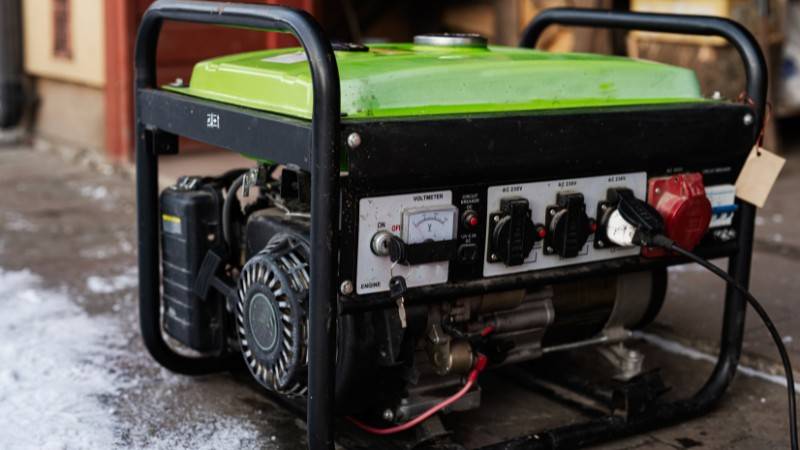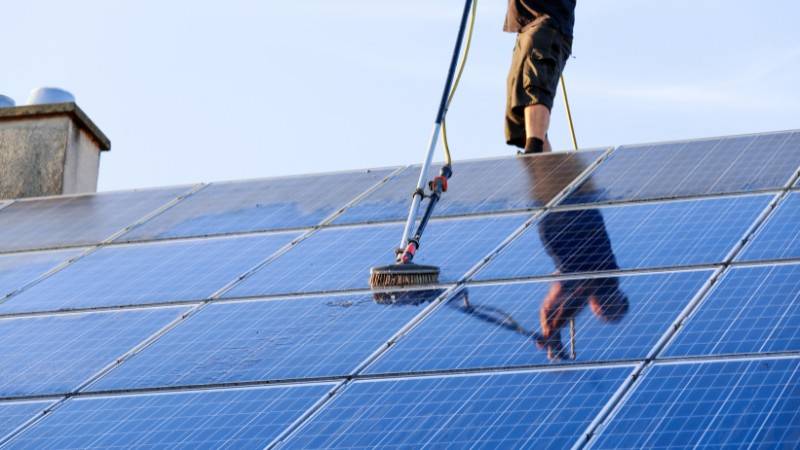So, you’re looking to invest in a generator for your home and can’t decide between a solar and gas generator?
I get it, it’s a tough choice.
Both options have their pros and cons, but understanding them can be like diving headfirst into a deep pool of jargon and technicalities.
No worries, though!
Think of me as your friendly guide, here to break down this complex world of energy into simple, digestible nuggets.
Together, we’ll delve into the finer details between a solar vs gas generator, comparing their performance, cost, and environmental impact to help you make an informed choice.
Exciting, right? Let’s get started!
What Is a Generator?
Remember those times when we had power outages and all our devices would just go off? I bet it was quite the hassle, especially when you were in the middle of an interesting movie or cooking up a storm in the kitchen. A generator, my friend, is the savior in such situations.
Let’s get to the basics:
A generator is a device that converts mechanical or chemical energy into electrical energy. It’s a bit like a magic box that produces power when your main electricity source goes off.
So, why is it important for homes?
Imagine you’re sitting in a dark house during a power outage, with your phone battery rapidly running out. A generator can be your knight in shining armor, providing electricity to power essential appliances like your fridge, heating or cooling systems, lighting, and of course, charging points for your devices.
Plus, it can also be a lifesaver in places where power cuts are frequent or last for long durations.
Now, generators come in different types. Here are a few:
- Diesel Generators: These are widely used due to their reliability and lower cost. They use diesel fuel to run.
- Natural Gas Generators: These generators use natural gas as fuel. They’re a cleaner alternative to diesel and are commonly used for residential purposes.
- Solar Generators: These are the environment-friendly kids on the block. Solar generators use sunlight to produce electricity, meaning they’re renewable and don’t contribute to pollution.
- Gasoline Generators: Common for small-scale applications, gasoline generators are portable and easy to use, but they may require more frequent refueling.
- Propane Generators: These generators use propane as their fuel source. They’re known for their longevity and are usually quieter than diesel or gas generators.
Each type has its own merits and demerits, which we’ll get into later. For now, our focus will be on solar and gas generators.
What Is a Solar Generator?
A solar generator, in its simplest terms, is a system that converts sunlight into electricity that you can use to power up your devices and appliances at home.
If you’re thinking this is all about green energy, you’re absolutely on point!
Solar generators, as their name suggests, harness the power of the sun, making them a renewable and environmentally friendly option.
A solar generator primarily consists of four key components –
- Solar panels
- Charge Controller
- Battery
- Inverter
But how do solar generators work? First up are the solar panels. These are the energy collectors, soaking up sunlight and transforming it into direct current (DC) electricity.

The DC electricity is raw and needs to be controlled, which is where the charge controller comes into play. It acts as a traffic cop of sorts, regulating the flow of electricity to prevent the battery from overcharging and subsequently damaging it.
Then we have the battery, the heart of the solar generator. It’s a storage unit, hoarding the electricity produced for use when the sun’s not shining.
Lastly, we have the inverter. This little guy is crucial because most of our home appliances run on alternating current (AC) electricity, not DC. The inverter converts the DC electricity stored in the battery into AC power, making it usable for our needs.
Using a solar powered generator means you’re relying on a natural, inexhaustible source of energy. Plus, you’re reducing your carbon footprint, which is a step in the right direction for our planet.
What Is a Gas Generator?
Ah, so now we’ve got the solar generator down, let’s explore its counterpart: the gas powered generator.
Gas generators are pretty common, and chances are you’ve encountered one, even if you didn’t realize it at the time.
In a nutshell, a gas generator is a device that uses combustible gas as fuel to generate electricity. The gas, most commonly natural gas or propane, is ignited in an internal combustion engine to produce mechanical energy. This energy then turns an alternator, which converts the mechanical energy into electrical energy. Think of it as an energy conversion relay race, with the baton smoothly passed from one process to another.
The primary components of a gas generator include the engine, alternator, fuel system, and cooling and exhaust systems. The engine initiates the whole process by igniting the gas, which triggers the alternator to generate electricity. The fuel system ensures a steady supply of gas, while the cooling and exhaust systems prevent overheating and safely expel waste gases.

One of the main perks of a gas generator is that it’s ready to go whenever you need it. As long as you have a steady gas supply, it can continuously produce electricity. It’s like having a powerhouse at your disposal, day or night, regardless of the weather.
However, while they’re reliable and potent, gas generators also come with a set of pros and cons that are important to consider, especially when comparing them to solar generators.
But we’ll get to that shortly. For now, I hope you’ve got a basic understanding of how both solar and gas generators work.
Solar vs Gas Generator: An In-depth Comparison
Having understood what solar and gas generators are, it’s time to put them head-to-head and see how they compare.
In this section, we’ll delve into a detailed comparison of these two energy providers, considering aspects like cost, efficiency, environmental impact, maintenance, and reliability.
We’ll explore the strengths and weaknesses of each, breaking down complex information into easily digestible bits.
By the end, you’ll be able to make a well-informed decision, choosing the best generator that suits your home, your needs, and your values.
So, without further ado, let’s get this comparison started!
Cost Comparison: Solar vs Gas Generators
When it comes to choosing between a solar and gas generator, cost plays a major role, doesn’t it?
After all, we want to make sure our investment is worth it. Let’s take a quick look at the cost of purchasing, installing, and maintaining these generators.
Generally, solar generators have a higher upfront cost compared to gas generators. A good-quality solar generator system can range from $1,000 to $5,000. Installation costs are usually minimal or sometimes even free, as most of these units are plug-and-play. The maintenance cost is also relatively low since there are no moving parts that require regular checks or repairs.
On the other hand, gas generators are cheaper upfront, costing anywhere between $500 and $2,500, depending on the size and power capacity. However, installation can be pricey if it involves professional wiring to your home’s electrical system. Moreover, maintenance costs can add up over time due to regular servicing and fuel expenses.
Let’s put these numbers into perspective with a table:
| Solar Generator | Gas Generator | |
|---|---|---|
| Purchase Cost | $1,000 - $5,000 | $500 - $2,500 |
| Installation Cost | Minimal to free | Can be high |
| Maintenance Cost | Low | Can be high over time |
| Fuel Cost | None (Solar power is free!) | High (Dependent on fuel costs) |
Examples of solar generators and their prices include the BLUETTI AC500 + B300S (around $4,800) and the Jackery Explorer 1000 (around $1,000).
Remember, the costs can vary based on brand, power capacity, and other features.
It’s also important to factor in the long-term costs, not just the upfront ones.
Efficiency and Performance
Performance matters, right?
Especially when it comes to keeping your entire house lit and your devices running. In this regard, both solar and gas generators have their strengths and limitations.
Gas powered generators are typically more potent, capable of producing a substantial amount of power instantly, and can operate continuously as long as there’s fuel. This makes them reliable, especially in emergency situations or during extended periods of power outages.
Solar generators, however, depend on the sun. On a sunny day, they can efficiently harness solar energy and power your devices, but their performance can be significantly reduced on cloudy days or at night.
On average, solar panels convert up to 23% of the sunlight they receive into electricity, whereas traditional gas generators convert around 35-40% of the energy from gasoline into electricity.
The efficiency and power output of both generator types can vary based on the specific models.
Also, it’s crucial to consider your location, weather conditions, and power needs when making a decision.
Environmental Impacts of Gas and Solar Generators
Let’s turn our attention to the planet now. When it comes to environmental impact, there’s a clear distinction between solar and fuel generators.
Starting with solar generators, they’re the clear winners from an eco-friendly perspective. They produce clean, renewable energy by harnessing the sun’s power, creating no harmful emissions in the process. Moreover, as per the International Energy Agency, power sector CO2 emissions decreased by 20 million tons in the USA because of solar and wind energy.

On the other side, gas generators rely on burning fossil fuels like natural gas or propane to generate electricity. This process results in the emission of greenhouse gases like carbon dioxide (CO2) and nitrogen oxides (NOx). According to the U.S. Energy Information Administration (EIA), natural gas emits about 0.97 pounds of CO2 per kWh of electricity produced. That’s not all; the extraction and transportation of natural gas also contribute to environmental pollution.
While advancements in technology have made fuel generators more efficient and less polluting than before, they still don’t quite match up to the clean energy provided by solar generators.
So if leaving a minimal carbon footprint is high on your priority list, a solar generator would be your pick.
Lifespan and Durability
How long a generator lasts and how well it can endure harsh conditions are factors worth considering. After all, we want an investment that stands the test of time and weather, don’t we?
Solar generators come with a promise of longevity. The solar panels themselves can last for 25 to 30 years, and even then, they don’t stop working; they just start operating less efficiently.
The battery, which usually needs replacement every 5-15 years depending on the type and usage, is the component with the shortest lifespan. Other parts like the charge controller and inverter, also have a robust life expectancy of 10 to 20 years.
Gas generators, however, generally have a shorter lifespan. With good maintenance, they can last for about 10 to 20 years. But remember, they have moving parts, which means more wear and tear. Moreover, they need to run regularly to avoid issues like carburetor clogging.
Therefore, the durability of a gas generator can significantly depend on its usage and maintenance.
In terms of weather resistance, both types have their strengths and vulnerabilities. Gas generators can operate regardless of the weather, while solar powered generators are reliant on sunlight. However, solar generators are silent operators with fewer moving parts, making them less prone to mechanical issues.
Noise Issue
Ever been disturbed by the drone of a noisy generator? Well, noise can be a significant deciding factor when choosing between a solar and a gas generator.
Let’s start with the solar generator. These are the quiet types. In fact, they’re virtually silent, only making minimal noise during the inverter operation. This is because they have no moving parts involved in their electricity production process.
So if you’re living in a quiet neighborhood or you just love tranquility, solar generators are a noise-free solution.
Contrarily, gas generators are known to create some noise. The decibel level can vary depending on the model and size, but even the quietest models emit a low rumble due to the internal combustion of the gas. Some advanced models come with noise reduction features, but they still can’t compete with the absolute silence of a solar generator.
So, when it comes to noise, solar generators undoubtedly have the upper hand. But there’s more to discuss, like the maintenance needs of both types. Let’s dive into that next.
Maintenance Needs
Maintenance is another important aspect to consider when choosing a generator. Let’s evaluate how our two contenders compare in this department.

Starting with solar generators, they require minimal maintenance. Once installed, these units mostly take care of themselves. Cleaning the solar panels from time to time to ensure optimal sunlight absorption is generally all that’s required.
The battery might need replacement every 5-15 years, depending on usage and battery type, but otherwise, these systems are pretty low-maintenance.
On the flip side, gas generators require more regular upkeep. This includes refilling the fuel, changing the oil, replacing filters, and occasionally getting the unit serviced by a professional to ensure optimal performance. If not used regularly, fuel generators can experience issues such as fuel gumming or carburetor clogging, which also need to be addressed.
In summary, if ease of maintenance is a priority for you, solar generators edge out gas generators.
Portability Consideration for Gas and Solar Generators
When we talk about generators, the convenience of portability can’t be overlooked. Whether for camping trips or as a backup during travel, having a generator that’s easy to move around is a big plus.
Portable solar generators or portable power stations are a popular choice for their mobility. Modern designs have optimized the components for compactness and lightweights. Some come with wheels and handles for easy transport, and the absence of fuel makes them particularly travel-friendly. They are silent, emission-free, and can be set up anywhere with access to solar power aka sunlight.
Gas generators, on the other hand, are typically heavier and bulkier due to their internal combustion engine. Portable models do exist, but even these tend to be heavier than their solar counterparts. Additionally, transporting fuel safely can be a concern when traveling.
In terms of portability, if you’re someone who values mobility, a portable solar generator might just be the ideal companion for your energy needs.
Pros and Cons of Solar Generators
Solar generators, like any other device, come with their unique set of advantages and disadvantages.
Let’s break these down:
Pros
Cons
- Eco-Friendly: Solar generators produce clean, renewable energy, reducing carbon footprint significantly compared to traditional energy sources.
- Silent Operation: These generators are virtually noise-free, providing a peaceful energy solution.
- Low Maintenance: With no moving parts, solar generators require minimal maintenance, mostly cleaning of panels and occasional battery replacement.
- Longevity: Solar panels can last for 25-30 years, while other components also have a long lifespan.
- Portability: Modern designs are lightweight, compact, and easy to transport, making them a great companion for camping or travel.
- Dependence on Sunlight: Performance can be limited in cloudy weather or during nighttime, as a solar generator relies on sunlight to produce power.
- Higher Initial Cost: While they save money in the long run, solar generators have a higher upfront cost compared to gas generators.
- Variable Performance: The efficiency of power generation can depend on factors such as weather, location, and the angle of sunlight.
- Battery Replacement: The battery component may need to be replaced every 5-15 years, depending on usage and battery type.
Pros and Cons of Gas Generators
Just like solar generators, fuel generators come with their own set of pros and cons. Here’s what to expect:
Pros
Cons
- Steady Power Supply: Gas generators can provide a consistent power supply irrespective of the weather or time of day, as long as there is fuel.
- Powerful: They can often generate more electricity compared to a solar generator of the same size, making them suitable for powering large appliances or entire homes.
- Lower Initial Cost: The upfront cost of a gas generator is typically lower than a solar generator.
- Wide Range of Sizes: Gas generators come in a variety of sizes, allowing users to choose based on their specific power needs.
- Environmental Impact: Gas generators produce greenhouse gases, contributing to climate change.
- Noise: These generators create noise during operation, which can be disruptive.
- Requires Regular Maintenance: Regular refilling of fuel, changing of oil, and occasional professional servicing are needed for optimal performance.
- Dependence on Fuel Availability: Fuel generators rely on a constant supply of fuel, which could be a problem during long power outages or in remote locations.
- Less Portable: While portable models are available, gas generators tend to be heavier and bulkier than solar generators, making them less ideal for travel.
Making Your Decision: Solar or Gas Generator?
As we have seen, both solar and gas generators come with their unique sets of advantages and disadvantages, making the choice between the two heavily dependent on individual needs and circumstances. Let’s summarize the key points to help you make an informed decision:
Solar generators stand out with their eco-friendliness, silent operation, low maintenance needs, and portability. They offer a sustainable, low-noise solution for your power needs, and with minimal upkeep. However, they do come with a higher initial cost, and their performance can be influenced by weather conditions.

Gas generators, on the other hand, can provide a steady power supply regardless of the weather, and often with greater power output. They also have a lower upfront cost. However, they can be noisy, require regular maintenance, and their operation results in greenhouse gas emissions.
If environmental impact and quiet operation are high on your priority list, a solar generator might be the way to go. But if you need a powerful, unfaltering energy source and you don’t mind the maintenance and noise, a gas generator could be a better fit.
In the end, the choice between a solar and gas generator is personal. Consider your power needs, environmental preferences, budget, and willingness for maintenance before making your decision. Whatever you choose, both are robust solutions to keep the lights on when you need them most.
Frequently Asked Questions (FAQ)
It depends on the size and power output of the solar generator, as well as the energy consumption of your home. Some large solar generators can power an entire house, but they may not be able to handle high-energy appliances for extended periods.
With proper maintenance, a gas generator can last between 10 to 20 years. Regularly changing the oil, using clean fuel, and getting it serviced professionally can help extend its lifespan.
If a solar generator doesn’t get enough sunlight, it won’t produce as much electricity. However, most solar generators store excess power in their batteries during peak sunlight hours, which can then be used when sunlight is scarce.
The frequency of refilling a gas generator depends on its fuel capacity and the power load. For example, a generator with a 5-gallon tank running at 50% load may need refilling every 7-10 hours. Always refer to the manufacturer’s instructions for precise information.
Solar generators can still work on cloudy or rainy days, but their efficiency will be reduced. The amount of electricity produced depends on the intensity of sunlight received by the panels.
Conclusion
Choosing between a solar powered generator and a gas generator isn’t a decision to be made lightly. Both options come with their own unique sets of advantages and disadvantages, and what works best for one person might not work as well for another.
Solar generators excel in areas such as environmental impact, noise level, and maintenance, whereas gas generators often outperform in power output and can operate continuously as long as there’s fuel. The choice ultimately comes down to your specific needs, your environmental consciousness, and your budget.
We hope this article has shed some light on the solar versus gas generator debate and will assist you in making an informed decision. Remember, there’s no one-size-fits-all solution when it comes to generators, so consider your unique situation and priorities before deciding.
Feel free to share your thoughts or experiences in the comments section below. Are you leaning towards a solar or gas generator, or are you still on the fence? We’d love to hear from you.
Thanks for reading and happy powering!

